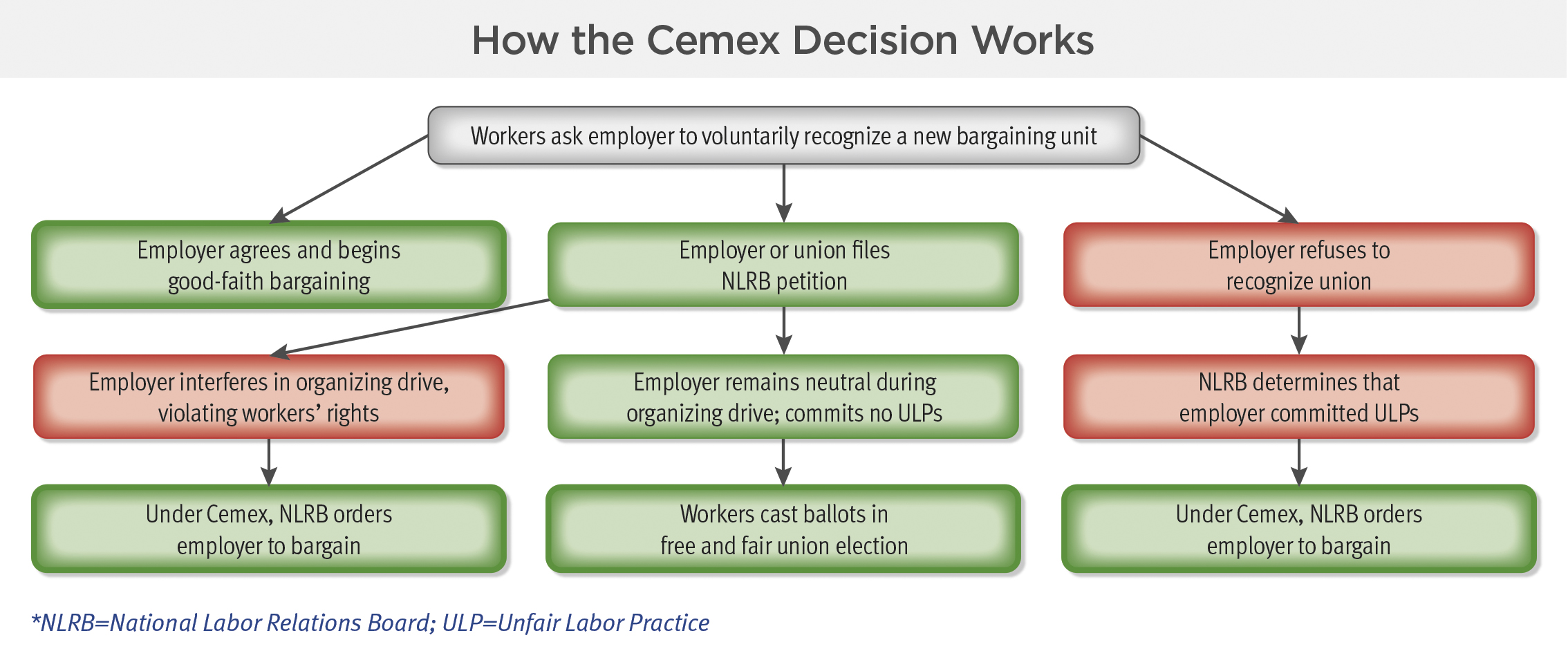The National Labor Relations Board dealt a massive blow to anti-union employers in August, making it harder than ever for companies to get away with harassing, intimidating and threatening workers to derail an organizing drive.
Now, under a ruling against Cemex Construction Materials Pacific, if a majority of workers sign cards seeking a union, an employer has 14 days to voluntarily recognize the new bargaining unit or call an election.
If they fail, the NLRB will do it for them.
“If an employer commits an unfair labor practice during an election campaign, the board will order the employer to recognize and bargain with the union,” International President Kenneth W. Cooper said. “It’s that simple. The NLRB will not order a re-run election.”
IBEW General Counsel Jon Newman said the Cemex ruling hits employers where it hurts.
“This is a big deal,” Newman said. “It makes the business cost higher to commit unfair labor practices during an election. Before, you could do it almost with impunity because the election would have to be re-run. Another election, more ULPs, and you re-run it. Wash, rinse, repeat.”
Putting an end to that “will have a significant impact on organizing,” Cooper said as he issued a list of best practices in October to help locals take full advantage of the ruling.
A group of workers seeking to join the United Food and Commercial Workers were the first to benefit from the Cemex standard. In September, an administrative law judge in Massachusetts ordered their law-breaking employer, cannabis company I.N.S.A. Inc., to the bargaining table.
Having refused to honor the union cards signed by a majority of employees, I.N.S.A. demanded an election, then fired union supporters and engaged in other misconduct that derailed the 2022 vote.
“The selective and disparate enforcement of previously ignored rules and policies against the organizers and key supporters clearly was intended to send a message… that such support could result in discipline or discharge,” Judge Andrew Gollin wrote.
The Cemex ruling itself was in response to a series of labor law violations committed by the construction materials company. In 2017, the Teamsters collected signed cards from 57% of about 360 workers at Cemex’s two dozen cement facilities in the area. The company hired a union-busting law firm and broke labor laws at least 20 times before the election, the NLRB found.
In its decision, the board made it clear that nearly any violation of labor laws during the critical period before a vote would be grounds to set the election aside and order the company to go directly to the bargaining table.
For decades, most companies that broke the law leading up to an election faced almost no risk or penalty. Typically, the board simply ordered another election, leaving organizers and increasingly deflated group of workers. No longer.
In Cemex, the board also made it an unfair labor practice to ignore unions when they present evidence that they have a majority of signatures in favor of joining in union.
“The goal is to have a free and fair selection process,” NLRB Chair Lauren McFerran told Bloomberg. “The Supreme Court has made clear you can have a selection process that involves voluntary recognition, or you can have a selection process that involves an election.”
Together with new rules announced the day before the Cemex ruling bringing back Obama-era election procedures, denying workers their right to fair representation elections will be very expensive.
“What was the cost of committing ULPs in the setting aside of an election? It wasn’t much, and now it is everything,” Newman said.
Big business had a collective meltdown at the board’s remedy for corporate malfeasance in union elections. The Chamber of Commerce howled it was a “long-held dream of labor unions” and that “the floodgates [are] now open.”
Newman said they’re overreacting: “The orders will only be issued when a company made a fair election impossible through illegal behavior. The only way they could be expecting a flood is if they know they broke the law in a lot of cases.”
The NLRB found that Cemex and its anti-union consultants repeatedly lied in forced-attendance meetings about “inevitable strikes,” and claimed that any facility that voted yes would likely close. Further, managers and supervisors threatened the livelihoods of workers who wore pro-union stickers on their hard hats, announced illegal policies banning workers from talking to union organizers, and disciplined and suspended workers for protected organizing activities, including one firing.
“This case was not run-of-the-mill,” Newman said. “Even under the pre-Cemex, business-friendly rules, the board said there was enough here to skip a second election and issue a bargaining order to Cemex. But the standard they adopted would apply to any ULP that impacted an election to such an extent that the election would have to be set aside, not just the worst of the worst.”
The board was so concerned that violating the law had become common business practice that it made the ruling retroactive by six months.
Newman said the Membership Development Department is looking for any lost elections during those six months in which an employer made an election impossible.
While important, the Cemex ruling did not deal with the essential problem of bargaining orders: There is still no legal requirement that a company negotiate a first contract with the union.
“It doesn’t change the need to do the work on our end: building strong volunteer organizing committees and educating and connecting with unit members so that in the end, we take enough power that businesses have to negotiate,” Newman said. “This makes it easier, not easy.”
He said that critics who decry the ruling as pro-union are missing the point.
“It’s pro-fairness,” Newman said. “All the ruling says is that if a company so violates the law that an organizing election is impossible, they don’t get rewarded with chances to do it again.”
This article originally appeared in the November issue of the IBEW Electrical Worker.

